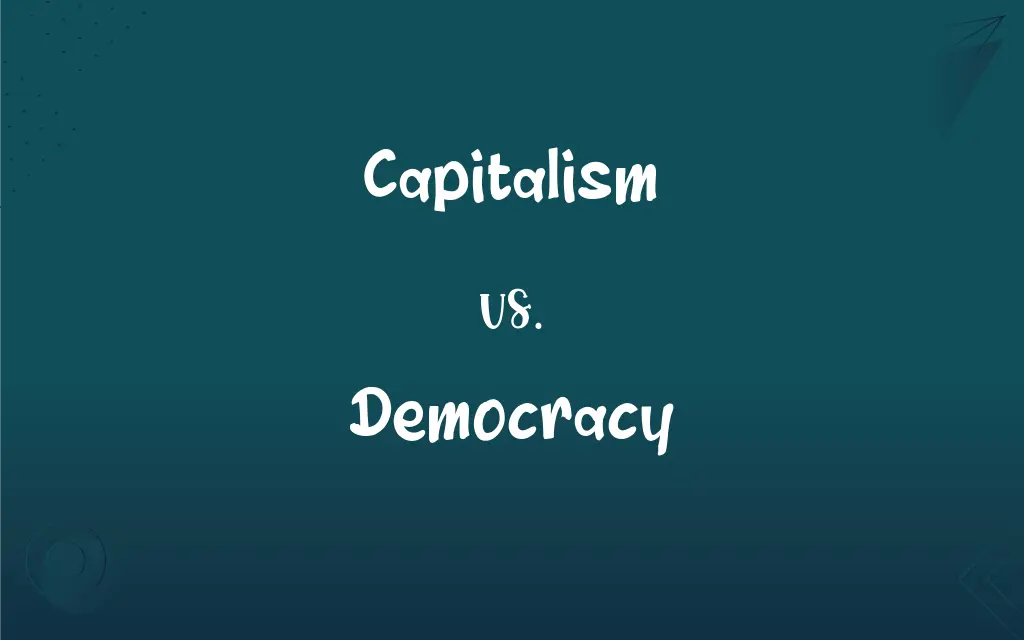Capitalism vs. Democracy: What's the Difference?
Edited by Harlon Moss || By Janet White || Published on February 27, 2024
Capitalism is an economic system based on private ownership and profit motive, while democracy is a form of government where power is vested in the people.

Key Differences
Capitalism is an economic system where individuals or corporations own capital goods. Democracy, in contrast, is a political system where government decisions are made by elected representatives or directly by the people.
In capitalism, the production and pricing of goods and services are dictated by the market. In democracy, the rule of law governs and ensures equality and freedom, irrespective of economic status.
Capitalism focuses on profit maximization and competition, driving innovation and economic growth. Democracy emphasizes political equality, with citizens having equal rights in decision-making processes.
The success of capitalism is measured by economic indicators like GDP growth, while democracy’s success is gauged by political stability and the protection of individual rights.
Capitalism can exist in various political systems, not exclusively in democracies. Conversely, democracies can adopt different economic models, not limited to capitalism.
ADVERTISEMENT
Comparison Chart
Nature
Economic system
Political system
Focus
Private ownership, profit motive
People's rule, equal representation
Key Principles
Market-driven production and pricing
Political equality, rule of law
Measurement of Success
Economic growth, innovation
Political stability, protection of rights
Compatibility
Can coexist with different political systems
Can incorporate various economic systems
ADVERTISEMENT
Capitalism and Democracy Definitions
Capitalism
Focused on profit-making and competition.
In capitalism, businesses compete to maximize profits.
Democracy
A political system where power is vested in the people.
Democracy allows citizens to elect their leaders.
Capitalism
An economic system based on private ownership and free market.
Capitalism encourages entrepreneurial ventures.
Democracy
Operates on principles of equal rights and freedom of speech.
Freedom of speech is a cornerstone of democracy.
Capitalism
Encourages private investment and business ownership.
Capitalism promotes private sector development.
Democracy
Ensures the rule of law and equal justice.
Democracy upholds the rule of law for all citizens.
Capitalism
Driven by consumer choices and capital accumulation.
Consumer demand is a key driver in capitalism.
Democracy
Characterized by fair and free elections.
Regular elections are essential in a democracy.
Capitalism
Market-oriented, where supply and demand determine prices.
Capitalism relies on market forces to regulate prices.
Democracy
Involves citizen participation in governance.
Active citizen engagement strengthens democracy.
Capitalism
An economic system in which the means of production and distribution are privately or corporately owned and development occurs through the accumulation and reinvestment of profits gained in a free market.
Democracy
Government by the people, exercised either directly or through elected representatives.
Capitalism
(politics) A socio-economic system based on private ownership of resources or capital.
Democracy
A political or social unit that has such a government.
Capitalism
(economics) An economic system based on private ownership of the means of production and their operation for profit.
Capitalism
A socio-economic system based on private property rights, including the private ownership of resources or capital, with economic decisions made largely through the operation of a market unregulated by the state.
Capitalism
An economic system based on the abstraction of resources into the form of privately owned capital, with economic decisions made largely through the operation of a market unregulated by the state.
Capitalism
An economic system based on predominantly private (individual or corporate) investment in and ownership of the means of production, distribution, and exchange of goods and wealth; contrasted with socialism or especially communism, in which the state has the predominant role in the economy.
Capitalism
An economic system based on private ownership of capital
FAQs
Does capitalism guarantee economic equality?
No, capitalism can lead to economic disparities.
Does democracy ensure economic success?
Not directly; it's more focused on political rights and freedoms.
Can a democracy not follow capitalist principles?
Yes, democracies can adopt various economic systems, not just capitalism.
How does capitalism affect consumers?
It offers choices, driven by consumer demand and market forces.
What is the core principle of capitalism?
Private ownership and profit motive are central to capitalism.
Are all capitalist countries democracies?
Not necessarily; capitalism can exist in various political systems.
Are human rights a core part of capitalist systems?
Human rights are more inherently tied to democracy than capitalism.
Do all democracies have free market economies?
Not all; some may have mixed or non-capitalist economies.
Does democracy require a specific economic system?
No, democracy is compatible with various economic systems.
Can there be monopolies in capitalism?
Yes, monopolies can form in capitalist economies.
Is capitalism focused on wealth redistribution?
No, wealth redistribution is not a central feature of capitalism.
Does democracy promote individual freedom?
Yes, individual freedom is a key aspect of democracy.
How do market failures affect capitalism?
Market failures can lead to economic crises in capitalist systems.
Is voting a feature of capitalism?
Voting is associated with democracy, not specifically capitalism.
Is freedom of speech part of capitalist ideology?
Freedom of speech is more a democratic than a capitalist principle.
Do democratic governments regulate economies?
Yes, to varying degrees, depending on the country.
Can capitalism lead to wealth concentration?
Yes, capitalism can result in wealth concentration in few hands.
How does capitalism influence innovation?
It often drives innovation through competition and profit motive.
Can a capitalist society be undemocratic?
Yes, a capitalist society can exist under undemocratic regimes.
Do democracies always have efficient markets?
Not always; efficiency varies based on policies and regulations.
About Author
Written by
Janet WhiteJanet White has been an esteemed writer and blogger for Difference Wiki. Holding a Master's degree in Science and Medical Journalism from the prestigious Boston University, she has consistently demonstrated her expertise and passion for her field. When she's not immersed in her work, Janet relishes her time exercising, delving into a good book, and cherishing moments with friends and family.
Edited by
Harlon MossHarlon is a seasoned quality moderator and accomplished content writer for Difference Wiki. An alumnus of the prestigious University of California, he earned his degree in Computer Science. Leveraging his academic background, Harlon brings a meticulous and informed perspective to his work, ensuring content accuracy and excellence.































































